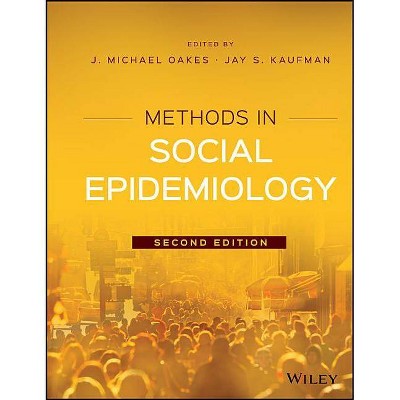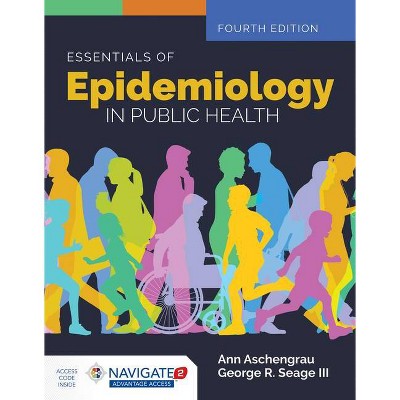Methods in Social Epidemiology - (Public Health/Epidemiology and Biostatistics) 2nd Edition by J Michael Oakes & Jay S Kaufman (Paperback)

Similar Products
Products of same category from the store
AllProduct info
<p/><br></br><p><b> Book Synopsis </b></p></br></br><b>A thorough, practical reference on the social patterns behind health outcomes</b> <p><i>Methods in Social Epidemiology</i> provides students and professionals with a comprehensive reference for studying the social distribution and social determinants of health. Covering the theory, models, and methods used to measure and analyze these phenomena, this book serves as both an introduction to the field and a practical manual for data collection and analysis. This new second edition has been updated to reflect the field's tremendous growth in recent years, including advancements in statistical modeling and study designs. New chapters delve into genetic methods, structural cofounding, selection bias, network methods, and more, including new discussion on qualitative data collection with disadvantaged populations. <p>Social epidemiology studies the way society's innumerable social interactions, both past and present, yields different exposures and health outcomes between individuals within populations. This book provides a thorough, detailed overview of the field, with expert guidance toward the real-world methods that fuel the latest advances. <ul> <li>Identify, measure, and track health patterns in the population</li> <li>Discover how poverty, race, and socioeconomic factors become risk factors for disease</li> <li>Learn qualitative data collection techniques and methods of statistical analysis</li> <li>Examine up-to-date models, theory, and frameworks in the social epidemiology sphere</li> </ul> <p>As the field continues to evolve, researchers continue to identify new disease-specific risk factors and learn more about how the social system promotes and maintains well-known exposure disparities. New technology in data science and genomics allows for more rigorous investigation and analysis, while the general thinking in the field has become more targeted and attentive to causal inference and core assumptions behind effect identification. It's an exciting time to be a part of the field, and <i>Methods in Social Epidemiology</i> provides a solid reference for any student, researcher, or faculty in public health.<p/><br></br><p><b> From the Back Cover </b></p></br></br><p><i>Methods in Social Epidemiology</i> provides students and professionals with a comprehensive reference for studying the social distribution and social determinants of health. Covering the theory, models, and methods used to measure and analyze these phenomena, this book serves as both an introduction to the field and a practical manual for data collection and analysis. This new second edition has been updated to reflect the field's tremendous growth in recent years, including advancements in statistical modeling and study designs. New chapters delve into genetic methods, structural cofounding, selection bias, network methods, and more, including new discussion on qualitative data collection with disadvantaged populations.</p> <p>Social epidemiology studies the way society's innumerable social interactions, both past and present, yields different exposures and health outcomes between individuals within populations. This book provides a thorough, detailed overview of the field, with expert guidance toward the real-world methods that fuel the latest advances.</p> <ul> <li>Identify, measure, and track health patterns in the population</li> <li> Discover how poverty, race, and socioeconomic factors become risk factors for disease</li> <li>Learn qualitative data collection techniques and methods of statistical analysis</li> <li>Examine up-to-date models, theory, and frameworks in the social epidemiology sphere</li> </ul> <p>As the field continues to evolve, researchers continue to identify new disease-specific risk factors and learn more about how the social system promotes and maintains well-known exposure disparities. New technology in data science and genomics allows for more rigorous investigation and analysis, while the general thinking in the field has become more targeted and attentive to causal inference and core assumptions behind effect identification. It's an exciting time to be a part of the field, and <i>Methods in Social Epidemiology</i> provides a solid reference for any student, researcher, or faculty in public health.</p><p/><br></br><p><b> About the Author </b></p></br></br><p><b>Michael Oakes</b>, PhD, is Associate Professor and Co-Director, US Census Data Research Center. Division of Epidemiology & Community Health, School of Public Health, University of Minnesota. In 2007 he was a named a McKnight Presidential Fellow, an award given to a select group of the University's most promising new associate professors. In 2010 he was awarded the Schuman award for excellence in graduate teaching, the School of Public Health's highest teaching honor. Among other things, he is currently Co-Chair of UMN's Institutional Review Board (IRB) for the protection of human research subjects and Vice-Chair of UMN's conflict of interest (COI) committee.</p> <p><b>Jay S. Kaufman</b>, PhD, is Professor and Canada Research Chair in Health Disparities in the Department of Epidemiology, Biostatistics and Occupational Health at McGill University, and Visiting Professor in the School of Public Health of the University of Chile. He is an editor at the journal Epidemiology and an associate editor at American Journal of Epidemiology, and has been awarded the Rothman Epidemiology Prize (1998), a Robert Wood Johnson Foundation Investigator Award in Health Policy Research (2006-2008), a Fulbright Fellowship (2007) and the Wade Hampton Frost Lectureship (2014).</p>
Price History
Price Archive shows prices from various stores, lets you see history and find the cheapest. There is no actual sale on the website. For all support, inquiry and suggestion messages communication@pricearchive.us




















